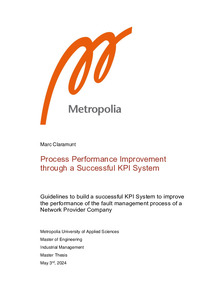Process Performance Improvement through a Successful KPI System
Claramunt, Marc (2024)
Claramunt, Marc
2024
All rights reserved. This publication is copyrighted. You may download, display and print it for Your own personal use. Commercial use is prohibited.
Julkaisun pysyvä osoite on
https://urn.fi/URN:NBN:fi:amk-2024051311301
https://urn.fi/URN:NBN:fi:amk-2024051311301
Tiivistelmä
This Master’s thesis aims to improve the performance of the fault management process of a Network Provider multinational company. This process is critical for the development of mobile network products that bring more than 10 bn EUR in revenue to the case company year after year. The fault management process is not operating efficiently, and some symptoms of this are high fault leakage to customer networks, slow fault correction time and unproductive synergies between different teams participating in the process.
This report explains the current state analysis of the fault management process, where it is argued that the root cause of the process underperformance is its KPI system. It also researches and elaborates on relevant literature findings and best practices applicable to solve the observed flaws. Then proceeds with the co-creation of a solution and set of guidelines on how to build a successful KPI system around the fault management process and finally, the validation stage of this proposal.
This thesis followed an applied research methodology, consisting of multiple interviews and workshops conducted with employees from the case company, alongside in-depth corporate documentation, and relevant literature. Following this approach, the achieved outcome of this thesis is a set of guidelines on how to build a new and successful KPI system that aligns the fault management process with the case company strategy and recovers its optimal performance.
This report explains the current state analysis of the fault management process, where it is argued that the root cause of the process underperformance is its KPI system. It also researches and elaborates on relevant literature findings and best practices applicable to solve the observed flaws. Then proceeds with the co-creation of a solution and set of guidelines on how to build a successful KPI system around the fault management process and finally, the validation stage of this proposal.
This thesis followed an applied research methodology, consisting of multiple interviews and workshops conducted with employees from the case company, alongside in-depth corporate documentation, and relevant literature. Following this approach, the achieved outcome of this thesis is a set of guidelines on how to build a new and successful KPI system that aligns the fault management process with the case company strategy and recovers its optimal performance.
